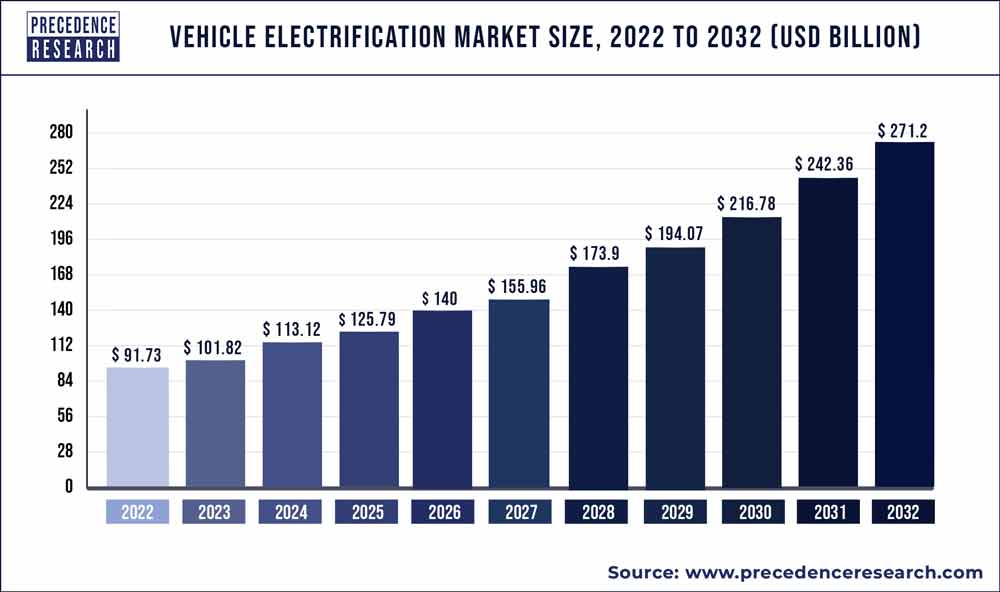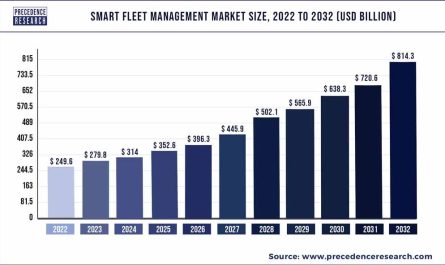The global vehicle electrification market size was valued at USD 101.82 billion in 2023 and is projected to expand over USD 271.2 billion by 2032 with a CAGR of 11.5% from 2023 to 2032.
Key Takeaway:
- The Asia-Pacific market was valued at USD 45.81 billion in 2022.
- North America is expected to reach at a CAGR of 10.9% over the forecast period.
- By hybridization, the ICE segment has captured revenue share of 61% in 2022.
- The PHEV segment is poised to grow at a CAGR of 14.7% over the forecast period.
- By product, the electric power steering (EPS) segment has captured 12.5% revenue share in 2022.
- The electric vacuum pump segment is growing at a CAGR of 12.4% over the forecast period.
Growth Factors
Several key factors are driving the growth of the vehicle electrification market. Firstly, stringent emission norms imposed by governments worldwide are compelling automakers to invest in electric and hybrid technologies to meet regulatory requirements. Additionally, advancements in battery technology, such as improvements in energy density and charging infrastructure, are making electric vehicles more practical and appealing to consumers. Moreover, government incentives and subsidies aimed at promoting electric vehicle adoption are further stimulating market growth.
Region Insights:
The vehicle electrification market exhibits regional variations in terms of adoption and growth. Developed regions such as North America and Europe have been at the forefront of electric vehicle adoption, driven by supportive government policies, robust charging infrastructure, and increasing consumer acceptance. Meanwhile, emerging economies in Asia-Pacific, particularly China, are witnessing significant growth in electric vehicle sales due to government initiatives promoting clean energy and investments in charging infrastructure. Latin America and Africa are also emerging as promising markets for vehicle electrification, albeit at a slower pace due to infrastructure challenges and affordability issues.
Report Scope of the Vehicle Electrification Market
| Report Highlights | Details |
| Market Size in 2023 | USD 101.82 Billion |
| Market Size by 2032 | USD 271.2 Billion |
| Growth Rate from 2023 to 2032 | CAGR of 11.5% |
| Largest Market | Asia Pacific |
| Fastest Growing Market | Europe |
| Base Year | 2022 |
| Forecast Period | 2023 to 2032 |
| Segments Covered | Product Type, Hibridization Type, Region Type |
Vehicle Electrification Market Dynamic
Drivers:
Several drivers are propelling the growth of the vehicle electrification market. One of the primary drivers is the increasing awareness of environmental sustainability and the need to reduce carbon emissions from transportation. Electric vehicles offer a cleaner and greener alternative to traditional gasoline-powered vehicles, making them attractive to environmentally conscious consumers and fleet operators. Additionally, the declining cost of battery technology and improvements in range and performance are enhancing the viability and attractiveness of electric vehicles, driving adoption rates globally.
Opportunities:
The vehicle electrification market presents numerous opportunities for industry players across the value chain. With the rapid expansion of electric vehicle charging infrastructure, there is a growing demand for related services and technologies, including smart charging solutions, energy management systems, and vehicle-to-grid integration. Moreover, advancements in autonomous driving technology and connectivity are opening up new possibilities for electric and hybrid vehicles, leading to the development of innovative mobility solutions and business models. Furthermore, partnerships between automakers, technology companies, and energy providers offer opportunities for collaboration and market expansion.
Challenges:
Despite the promising growth prospects, the vehicle electrification market faces several challenges that need to be addressed. One of the primary challenges is the high upfront cost of electric vehicles compared to conventional vehicles, which poses a barrier to widespread adoption, especially in price-sensitive markets. Additionally, concerns about range anxiety, charging infrastructure availability, and battery durability continue to hinder consumer confidence in electric vehicles. Furthermore, the transition to electric mobility requires significant investments in manufacturing capabilities and supply chain infrastructure, which may strain resources for some industry players.
Read Also: Barge Transportation Market Size to Reach US$ 196.03 Bn by 2032
Competitive Landscape:
The vehicle electrification market is highly competitive, with numerous automakers, technology companies, and startups vying for market share and dominance. Established automakers are investing heavily in electric vehicle research and development to stay competitive and comply with regulatory requirements. Meanwhile, new entrants and startups are disrupting the market with innovative electric vehicle designs, battery technologies, and mobility solutions. Strategic partnerships and collaborations between traditional automakers and technology companies are becoming increasingly common as companies seek to leverage each other’s strengths and accelerate the pace of innovation. Overall, the competitive landscape is dynamic and evolving rapidly as industry players navigate the transition towards electric mobility.
Several noteworthy market participants contributing to the market revenue are as follows
- Continental
- Valeo
- Robert Bosch GmbH
- Denso
- Mitsubishi Electric Corporation
- Johnson Electric
- Delphi Automotive PLC
Segments Covered in the Report
This research study comprises complete valuation of the market revenue with the help of widespread quantitative and qualitative insights, and prognoses of the market. This report presents breakdown of market into forthcoming and niche segments. Additionally, this research study gauges market revenue growth and its drift at global, regional, and country from 2020 to 2032. This report includes market division and its revenue assessment by categorizing it depending on product, hybridization, and region:
By Product
- Electric Power Steering (EPS)
- Integrated Starter Generator (ISG)
- Start/Stop System
- Electric Air Conditioner Compressor
- Liquid Heater Ptc
- Electric Oil Pump
- Electric Vacuum Pump
- Starter Motor & Alternator
- Electric Water Pump
- Actuators
By Hybridization
- Internal Combustion Engine (ICE) & Micro-Hybrid Vehicle
- Battery Electric Vehicle (BEV)
- Plug-in Hybrid Electric Vehicle (PHEV)
- Hybrid Electric Vehicle (HEV)
By Regional Outlook
- North America
- U.S.
- Canada
- Europe
- U.K.
- Germany
- France
- Asia Pacific
- China
- India
- Japan
- South Korea
- Rest of the World
Contact Us:
Mr. Alex
Sales Manager
Call: +1 9197 992 333
Email: sales@precedenceresearch.com
Web: https://www.precedenceresearch.com
Blog: https://www.expresswebwire.com/


